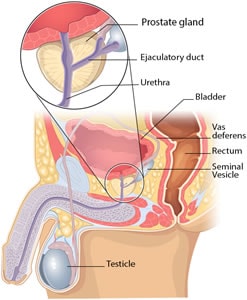Cancer is a disease in which cells in the body grow out of control. When cancer starts in the prostate, it is called prostate cancer1 . Except for skin cancer, prostate cancer is the most common cancer in American men. Jay Harold wrote this post, “2 Benefits and 3 Harms of Prostate Cancer Screening,” to give you more information about this deadly disease that affects Black Men at a higher rate than other men.
The CDC2 states In 2015, 183,529 new cases of Prostate Cancer were reported, and 28,848 men died of Prostate Cancer in the United States. For every 100,000 men, 99 new Prostate Cancer cases were reported, and 19 died of cancer. It gets worse for Black Men. African-American men are nearly 2.43 times more likely to die from the disease.
Jay Harold wrote a post in August of 2016 (8 Symptoms of Prostate Cancer: Risk Factors & Health Tips), that provides additional information about Prostate Cancer. Men: Before getting screened for prostate cancer, learn about the possible benefits and harms of screening and talk to your doctor. Should you get screened for prostate cancer?
The answer is different for each man. Before getting screened for prostate cancer, learn about the possible benefits and harms of screening so that you can make the best choice for you. Talk to your doctor about your personal risk for prostate cancer to figure out what is right for you.
What is the prostate?
The prostate is a small gland in men. It is part of the male reproductive system. The prostate is about the size and shape of a walnut. It sits low in the pelvis, below the bladder and just in front of the rectum. The prostate helps make semen, the milky fluid that carries sperm from the testicles through the penis when a man ejaculates. The prostate surrounds part of the urethra, a tube that carries urine out of the bladder and through the penis.
What Is Prostate Cancer Screening4 ?
Cancer screening means looking for cancer before it causes symptoms. The goal of screening for prostate cancer is to find cancer early that may spread if not treated.
Screening for prostate cancer begins with a blood test called a prostate-specific antigen (PSA) test. PSA is a substance your prostate makes. This test measures the level of PSA in your blood. Your PSA level may be high if you have prostate cancer. Remember, your PSA level may be high for many reasons, such as having an enlarged prostate, a prostate infection, or taking certain medicines.
What Are the Possible Benefits and Harms of Screening?
Benefits
- Screening may find cancer that is likely to spread to other places in the body, so it can be treated before it spreads.
- This may lower the chance of death from prostate cancer in some men.
But most prostate cancers grow slowly and don’t cause any health problems. If a screening test finds slow-growing cancer, it may cause you to worry, and lead to unneeded tests and treatments that can have serious side effects.
Also, a PSA test can be abnormal, but you don’t have prostate cancer. This is called a false positive result. A false positive PSA test result often leads to more unnecessary tests.
The only way to know if an abnormal test is due to cancer is to do a biopsy. A biopsy is when a small piece of tissue is removed from the prostate and looked at under a microscope to check for cancer.
Harms
A prostate biopsy can cause—

- Pain.
- Blood in the semen or ejaculate.
- Infection.
Treatments
The most common treatments for localized (early-stage) prostate cancer are surgery to remove the prostate, radiation therapy, and active surveillance(getting tested regularly, and treating the cancer only if it grows or causes symptoms). Side effects from radiation therapy or surgery may include—
- Impotence.
- Loss of bladder control.
- Bowel problems.
Talk to Your Doctor
If you are thinking about being screened, you and your doctor should consider—
- If you have an increased risk of getting prostate cancer.
- If you have any health problems that may make it harder for you to be treated for prostate cancer if it is found, or that may make you less likely to benefit from screening.
- How you feel about the possible benefits and harms of screening, diagnosis, and treatment.
Should I Get Screened for Prostate Cancer5 ?
In 2018, the U.S. Preventive Services Task Force (USPSTF) made the following recommendations about prostate cancer screening—
- Men who are 55 to 69 years old should make individual decisions about being screened for prostate cancer with a prostate-specific antigen (PSA) test.
- Before making a decision, men should talk to their doctor about the benefits and harms of screening for prostate cancer, including the benefits and harms of other tests and treatment.
- Men who are 70 years old and older should not be screened for prostate cancer routinely.
This recommendation applies to men who—

- Are at average risk for prostate cancer.
- Are at increased risk for prostate cancer.
- Do not have symptoms of prostate cancer.
- Have never been diagnosed with prostate cancer.
Other organizations, like the American Urological Association, the American Cancer Society, and the American College of Physicians may have other recommendations.
Things to Consider about Prostate Screening
If you are thinking about being screened, you and your doctor should consider—
- If you have a family history of prostate cancer.

- If you are African-American.
- If you have other medical conditions that may make it difficult for you to be treated for prostate cancer if it is found, or that may make you less likely to benefit from screening.
- How you value the potential benefits and harms of screening, diagnosis, and treatment.
Facts About Prostate Cancer Screening
- For every 1,000 men between the ages of 55 and 69 years old who are screened, about one death will be prevented, and three men will be prevented from getting prostate cancer that spreads to other places in the body.
- Many men with prostate cancer never experience symptoms and, without screening, would never know they had the disease.
- Half of the men who die from prostate cancer are 80 years old or older.
While all men are at risk of developing prostate cancer, some men are at greater risk than others. In the United States, men of African descent are more likely to develop prostate cancer than any other race or ethnicity and are nearly 2.4 times more likely to die from the disease. However, these statistics oversimplify the complex reality for men of African descent: across the board, African-American prostate cancer patients present with higher grade disease, are younger, have higher PSA levels and have a greater incidence of metastatic disease across all age groups compared with Caucasian men.
Jay Harold hopes that you enjoyed this post, “2 Benefits and 3 Harms of Prostate Cancer Screening.” Please share it with others. Jay Harold has put together a Resource page that you may find useful when trying to improve your health and wealth. Please take this advice from Muhammad Ali and give back to others. “Service to others is the rent you pay for your room here on earth.”
Bibliography
- https://www.cdc.gov/cancer/prostate/basic_info/what-is-prostate-cancer.htm
- https://gis.cdc.gov/Cancer/USCS/DataViz.html (#of Cancer Deaths and Prostate Cancer)
- https://www.pcf.org/c/understanding-and-resolving-health-disparities-in-prostate-cancer/
- https://www.cdc.gov/cancer/dcpc/resources/features/prostatecancer/index.ht
- https://www.cdc.gov/cancer/prostate/basic_info/get-screened.htm
- https://www.pcf.org/c/understanding-and-resolving-health-disparities-in-prostate-cancer/




